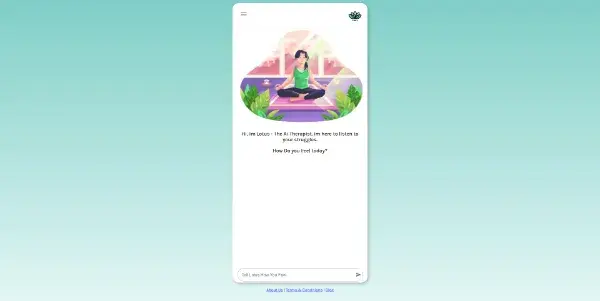Lotus

A ChatBot that acts as a virtual therapist and gives you a safe space to express your emotions
Lotus AI: A Virtual Therapeutic Companion
What is Lotus AI?
Lotus AI is a free chatbot designed to function as a virtual therapist, providing users with a safe and confidential space to explore and express their emotions. Unlike many AI chatbots focused on information retrieval, Lotus prioritizes emotional support and well-being. It leverages natural language processing to understand user input and respond with empathy and understanding, aiming to facilitate emotional processing and self-reflection. This makes it a valuable tool categorized as both amazing assistive technology and a life assistant.
Main Features and Benefits
Lotus AI offers several key features that contribute to its therapeutic capabilities:
- Safe and Confidential Space: Interactions with Lotus are private and designed to foster a sense of trust. User data is handled responsibly and ethically, prioritizing confidentiality.
- Empathetic Responses: The AI is trained to respond with empathy and understanding, acknowledging and validating users' emotions.
- Non-Judgmental Environment: Unlike interactions with other people, Lotus provides a space free from judgment or criticism, allowing users to express themselves freely.
- Emotional Exploration: Through guided conversations, Lotus helps users explore their feelings, identify triggers, and develop coping mechanisms.
- Accessibility: As a free, readily accessible online tool, Lotus removes financial barriers often associated with seeking professional therapeutic help.
Benefits of using Lotus include:
- Improved emotional regulation: Regular interaction can help users better understand and manage their emotions.
- Increased self-awareness: The reflective nature of the conversations fosters greater self-understanding.
- Reduced stress and anxiety: The safe and supportive environment can provide relief from emotional distress.
- Accessibility to mental health support: Lotus offers a readily available option for individuals who may not have access to traditional therapy.
Use Cases and Applications
Lotus AI has a wide range of potential applications for individuals seeking emotional support:
- Stress and anxiety management: Users can use Lotus to process stressful events and develop coping strategies.
- Emotional processing after trauma: The safe and non-judgmental environment can facilitate processing difficult experiences.
- Self-reflection and personal growth: Lotus can be used as a tool for self-discovery and personal development.
- Support for individuals with limited access to mental health services: Lotus offers an accessible alternative for those in underserved areas or facing financial constraints.
- Supplement to traditional therapy: Lotus can be used in conjunction with professional therapy to enhance the therapeutic process.
Comparison to Similar Tools
Several other AI-powered mental health tools exist, but Lotus distinguishes itself through its focus on emotional support and its free accessibility. While some competitors offer more sophisticated features (like personalized plans or integration with other health apps), they often come with subscription fees. Lotus provides a valuable baseline level of emotional support without any cost. It's crucial to remember that Lotus is a supplementary tool and should not replace professional therapeutic intervention when necessary.
Pricing Information
Lotus AI is completely free to use. There are no subscription fees, in-app purchases, or hidden costs associated with its use. This makes it a highly accessible resource for individuals seeking emotional support.
Conclusion
Lotus AI offers a valuable and accessible tool for individuals seeking emotional support and a safe space to process their feelings. While it shouldn't replace professional help, its free and readily available nature makes it a significant addition to the landscape of mental health resources. Its focus on empathy and emotional exploration sets it apart, making it a promising addition to the assistive technology and life assistant categories.